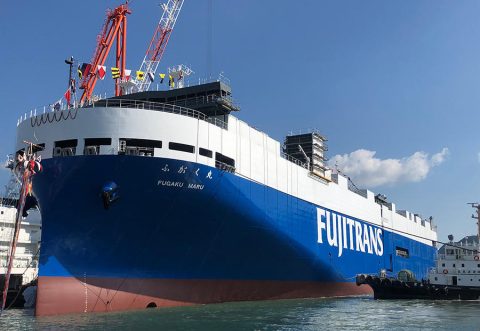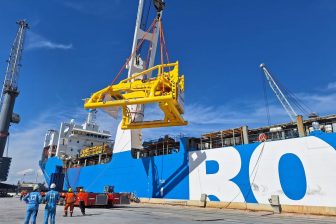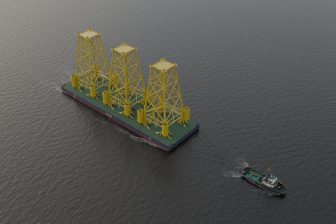
Mitsubishi launches new Fugaku Maru RoRo
Mitsubishi Shipbuilding, a Mitsubishi Heavy Industries (MHI) Group company has christened and launched the Fugaku Maru, a roll-on/roll-off (RoRo) ship under construction for Fujitrans Corporation. The ceremony took place at the Enoura Plant of MHI’s Shimonoseki Shipyard & Machinery Works in Yamaguchi Prefecture.
The handover is scheduled for April 2024 following the completion of outfitting work and sea trials. The new vessel will replace the current Fugaku Maru, originally constructed at MHI’s Nagasaki Shipyard & Machinery Works, which has been in continuous service since 1997.
The new Fugaku Maru is 165 meters in overall length, 27.6 meters in breadth and has a gross tonnage of approximately 13,000. It can simultaneously transport up to 50 trailer chassis and 1,511 passenger cars. Fuel efficiency has been significantly improved in the new vessel with the adoption of a vertical stem in the bow to reduce propulsion resistance, complemented by high-efficiency propellers and the use of low-friction paint.
The onboard power generator can be shut down through the connection of an onshore power receiving system installed in the engine room and power distribution equipment slated for installation in ports. In the future, this advance will enable zero emissions while the ship is in port.
The new Fugaku Maru features a wider beam than its predecessor, and structural innovations have enabled the elimination of pillars on the trailer loading deck. Together with these improvements, the ship will provide greater turning space for trailers, resulting in enhanced loading efficiency.
Today, a modal shift is underway toward marine transport in a quest to reduce CO2 emissions from land transportation modes, offset shortages of long-distance truck drivers, and align with workstyle reforms. In response, going forward Mitsubishi Shipbuilding aims to work with its business partners to solve diverse issues through the construction of ferries and RO/RO ships that will contribute to stable navigation while also providing outstanding energy and environmental performance.
You just read one of our premium articles free of charge
Register now to keep reading premium articles.




